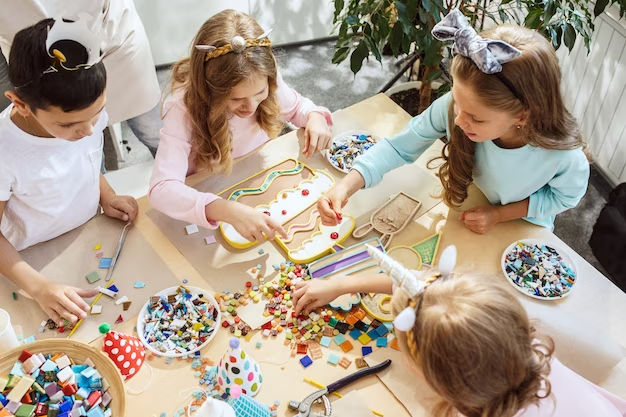Preschools serve as foundational environments where children develop not only academic skills but also crucial social and emotional competencies. Peer collaboration and teamwork are integral aspects of a child's social development, laying the groundwork for future interpersonal relationships. This essay explores effective strategies that preschools can implement to encourage peer collaboration and teamwork, fostering a positive and cooperative learning environment.
Creating Collaborative Learning Spaces
Preschools can cultivate peer collaboration by designing learning spaces that encourage interaction and teamwork. Classrooms arranged in small groups or clusters facilitate communication among children. Providing shared workstations, group tables, or collaborative project areas allows children to engage with each other, promoting a sense of community and shared learning experiences.
Incorporating Cooperative Activities
Integrating cooperative activities into the curriculum is a powerful strategy for promoting peer collaboration. Preschools can design games, projects, and learning tasks that require children to work together towards a common goal. These activities may include group art projects, team-building games, or collaborative storytelling. By engaging in shared experiences, children develop teamwork skills and learn to appreciate the contributions of their peers.
Encouraging Turn-Taking and Sharing
Preschools play a crucial role in teaching fundamental social skills such as turn-taking and sharing. These behaviors are foundational to effective collaboration. Teachers can incorporate activities that explicitly require children to take turns or share materials. Modeling and reinforcing these behaviors create a positive and cooperative atmosphere, emphasizing the importance of considering others' perspectives and needs.
Implementing Group Challenges
Group challenges provide opportunities for children to collaborate and problem-solve together. Preschools can introduce age-appropriate challenges that require teamwork, such as building structures with blocks, completing puzzles, or organizing objects based on specific criteria. These challenges not only enhance collaboration but also foster a sense of accomplishment and camaraderie when the group successfully achieves its goals.
Promoting Communication Skills
Effective communication is a cornerstone of successful collaboration. Preschools can implement strategies to enhance children's communication skills, such as group discussions, show-and-tell sessions, or storytelling circles. These activities encourage children to express their thoughts, listen to their peers, and develop the ability to work together to convey ideas. Communication skills cultivated in preschool lay the foundation for positive peer interactions in the future.
Pairing Children Strategically
Strategic pairing of children in activities can enhance peer collaboration. Preschool teachers can consider each child's strengths and areas for growth when forming pairs or small groups. Mixing children with different abilities allows them to learn from each other, providing opportunities for peer mentoring and fostering a collaborative spirit. Pairing strategies should promote inclusivity and ensure that every child feels valued within the collaborative process.
Celebrating Group Achievements
Recognizing and celebrating group achievements is a motivational strategy for encouraging peer collaboration. Preschools can acknowledge and showcase collaborative projects or activities through displays, certificates, or group celebrations. Celebrating collective successes reinforces the idea that collaboration leads to positive outcomes and encourages children to continue working together towards shared goals.
Creating a Positive and Inclusive Classroom Culture
Preschools play a vital role in shaping the overall culture of the classroom. Establishing a positive and inclusive environment promotes peer collaboration and teamwork. Teachers can model inclusive behaviors, celebrate diversity, and create a classroom culture where every child feels welcomed and valued. In such an atmosphere, children are more likely to engage in collaborative activities with a sense of belonging and mutual respect.
Suggesting a Preschool: Nurturing Collaboration and Teamwork
When choosing a preschool for their child, parents should seek institutions that prioritize strategies to nurture collaboration and teamwork. Consider preschools that create collaborative learning spaces, incorporate cooperative activities into the curriculum, encourage turn-taking and sharing, implement group challenges, promote communication skills, strategically pair children, celebrate group achievements, and foster a positive and inclusive classroom culture. A preschool that actively embraces these strategies provides a foundation for the development of crucial social and teamwork skills.

Related : How to Instill Tolerance and Inclusivity in Preschoolers: Practical Tips
Montessori Shir-Hashirim Los Angeles
- 6047 Carlton Way, Los Angeles, CA 90028
- Highly rated for focused curriculum, excellent staff, and diverse extracurriculars
- Half day: $27,000 yearly, $9,000 quarterly
- Full day: $28,500 yearly, $9,500 quarterly
Shir-Hasirim Montessori school has two different locations. The main location is on Carlton Way in Los Angeles. This school teaches children between the ages of 2 and 6 and prepares them for some of the top Montessori elementary schools in the city. Specifically, they offer a primary program and a summer program for preschool children.
At Shir-Hashirim, they allow their students to grow and learn both individually and within the community of the school. Students are able to learn at their own pace when it comes to both practical life skills and subjects such as math and language.
Shir-Hashirim Montessori has a parent-and-me program that is best for the families who may enroll their child in the Montessori program.
Conclusion
In conclusion, fostering peer collaboration and teamwork in preschools is essential for the social and emotional development of young children. By creating collaborative learning spaces, incorporating cooperative activities, encouraging turn-taking and sharing, implementing group challenges, promoting communication skills, strategically pairing children, celebrating group achievements, and fostering a positive and inclusive classroom culture, preschools contribute to the cultivation of valuable interpersonal skills. These skills not only support academic success but also lay the groundwork for positive social interactions in the future.


